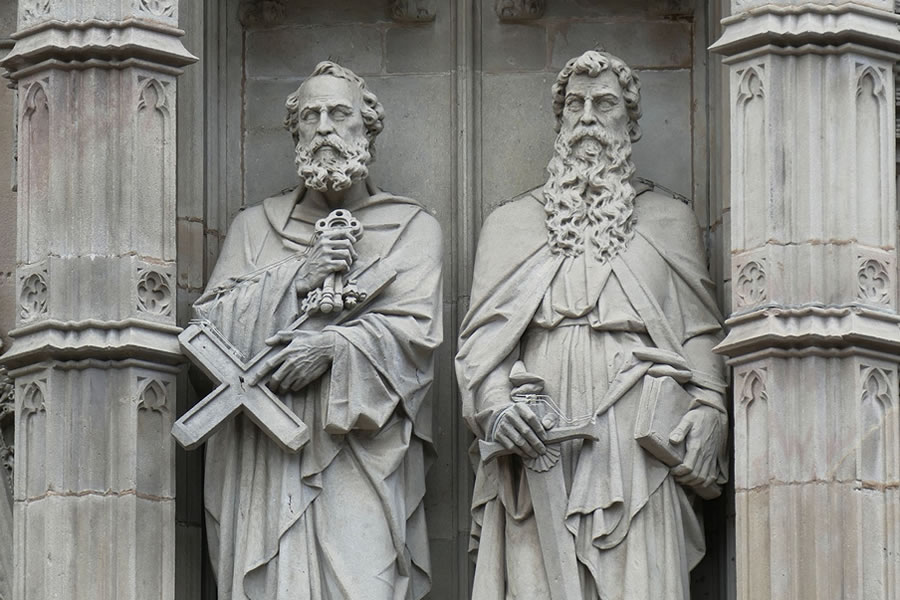
The Princes of the Apostles
by Fr. Tony Okolo C.S.Sp., V.F. | 06/29/2025 | Weekly ReflectionBeloved Parishioners,
My reflection today is centered on the Solemnity of Peter and Paul. The letter to the Hebrews 13:7 reads: “Remember your leaders, those who preached the word of God to you; and as you reflect on the outcome of their life, imitate their faith,” and it is on that note that we choose to joyfully reflect on the outcome of the lives of the Princes of the Apostles – Peter and Paul.
We remember these two ardent apostles for their extraordinary contributions to the foundation and spread of Christianity. So vital is their roles to Christianity that the Church joyfully celebrates the solemnity of Saints Peter and Paul universally on June 29th.
One may wonder why St. Paul is called an Apostle even though he never saw Christ in the flesh. We ought to note that the term apostle (from the Greek apostolos, meaning “one who is sent”) is broader and refers to anyone sent on a mission with authority by Jesus or the early Church. In that sense, apostles are messengers and authoritative witnesses of Christ’s resurrection, given the task to preach, teach, and establish churches. So, while the Twelve are the original apostles, there are others who were called apostles in the New Testament, such as Matthias (Acts 1:26), Barnabas (Acts 14:14), and notably our own dear Paul (1 Corinthians 15:8–9; Acts 9). Paul’s apostleship is unique because he encountered the risen Christ in a dramatic way on the road to Damascus (Acts 9:3–6), receiving a direct commission from Jesus Himself to be an apostle to the Gentiles (Acts 26:14–18). Paul himself acknowledged his unique status, describing himself as “one born out of due time” (1 Corinthians 15:8).
Though very different in background and temperament, Saints Peter and Paul share a unique bond in their apostolic calling and witness. Peter, the fisherman called directly by Jesus and named the “Rock” upon which Christ would build His Church, represents the foundation of ecclesial authority and pastoral leadership (Matt. 16:18-20). He is also credited with authoring 2 books of the New Testament as well as furnishing Mark the evangelist with the data with which he wrote the Gospel according to Mark. Paul, once a zealous persecutor of Christians, experienced a dramatic conversion and became the “Apostle to the Gentiles,” tirelessly preaching the Gospel throughout the Roman world and authoring 13 epistolary books of the New Testament (Acts 28:31).
The Church’s apostolic nature is rooted in the ministry of Peter and Paul. The papacy traces its authority to Peter’s role as the “Rock” (Matthew 16:18- 19). Peter was among the first missionaries since he undertook several missionary journeys and was instrumental in spreading the Gospel beyond Jerusalem notably in Judea and Samaria (Lydda, where he healed Aeneas, and Joppa, where he had a vision that led to the evangelization of Gentiles (Acts 9:32-43; Acts 10)). Additionally, tradition and early Church historians like Origen and Eusebius record that Peter founded the Church in Antioch and served as its first bishop. Antioch was a major center from which missionary activity expanded, and it was here that followers were first called “Christians” (Galatians 2:11; Acts 11:26). Later traditions and writings suggest Peter traveled widely, including to regions in Asia Minor (modern Turkey), Phoenicia, and eventually to Rome, where he became the first bishop and was martyred.
Paul’s missionary journeys model the Church’s universal mission. Before Saint Paul began his apostolic mission, the early Christian Church was primarily located in Jerusalem and Galilee (modern-day Israel/ Palestine), where the first followers of Jesus gathered. It was Saint Paul’s apostolic mission which significantly expanded Christianity beyond its original Jewish context, spreading it widely across three continents and numerous modern-day countries: Asia Minor (Modern Turkey) - cities like Antioch, Tarsus, Iconium, Ephesus, Pisidian Antioch, Lystra, Derbe; Europe - cities: Philippi, Thessalonica, Berea, Athens, Corinth, Nicopolis; North Africa and the Mediterranean – places llike Alexandria (Egypt) and Cyrene(modern Libya); and finally Rome and Italy. More so, the Magisterium consistently upholds their example and teachings as a guide for the Church’s life and mission.
BACK TO LIST